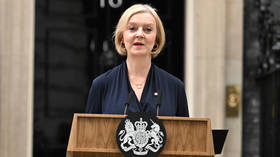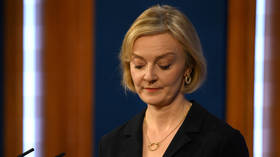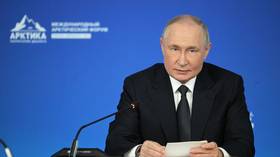UK PM steps down after 6 weeks in power

British Prime Minister Liz Truss announced her resignation on Thursday, having spent just 45 days in office. She has become the shortest-serving premier in UK history.
Truss’ rapid downfall follows a series of political missteps and the resignation of several members of her government, including Home Secretary, Suella Braverman earlier this week.
Pressure for Truss to step down from within her own Conservative party has been mounting since last month.
Speaking outside 10 Downing Street, Truss said she had tendered her resignation as leader of the Conservative Party to King Charles.
She acknowledged that she could not “deliver the mandate” she had been elected on in early September, adding that she came to power at a time of “great economic and international instability.”
Truss also revealed that a vote to determine the Conservative Party’s new leader, and the UK’s new head of government, will be held “in the next week.” For the time being, she will remain in a caretaker capacity, the outgoing PM added.
With just 45 days in office, Truss has become the shortest-serving prime minister in the country’s history. Previously, George Canning held that dubious distinction, having stayed in office for 119 days before passing away in 1827.
Clouds first began gathering over Truss in late September, just weeks after she came to power, with a mini-budget devised by her and then-Chancellor of the Exchequer Kwasi Kwarteng sending shockwaves across the financial markets.
The pound hit an all-time low in response to the major tax cuts announced by the British government, with Truss and Kwarteng forced to make a U-turn on the plan to abolish the top income tax rate of 45% on high earners.
On October 14, the British premier sacked Kwarteng, replacing him with former head of the Foreign Office Jeremy Hunt. However, fellow conservatives saw her as co-responsible for the controversial mini-budget, with calls for Truss’ resignation mounting among the Tories.
The new Chancellor scaled down nearly all of Truss’s disastrous mini-budget, including the scheme that envisaged capping energy bills for two years.
The prime minister’s position was further undermined by chaotic scenes playing out in Parliament on Wednesday during a vote on a Labour motion over fracking. Opposition lawmakers claimed MPs from the Conservative Party had been bullied and physically manhandled into toeing Liz Truss’s line – an episode government ministers have strongly denied. Reacting to these claims, House of Commons Speaker Sir Lindsay Hoyle said he had ordered a probe.
Meanwhile, speculation is mounting as to who could replace Truss in Downing Street. According to a YouGov Political Research snap poll, most Conservative Party members want former prime minister Boris Johnson to return to power, with such heavyweights as former Chancellor of the Exchequer Rishi Sunak, Defence Secretary Ben Wallace, Leader of the House of Commons Penny Mordaunt, incumbent Chancellor of the Exchequer Jeremy Hunt all named as possible contenders for the party leadership.
The latter, however, has already made it clear he will not run for prime minister.
Meanwhile, the leader of the opposition Labour party, Sir Keir Starmer, has called for an immediate general election, arguing that the Conservatives have shown they “no longer [have] a mandate to govern.”
Starmer went on to describe the political tribulations within the Tory party, which have already seen two premiers step down in 2022, a “revolving door of chaos.”
The Labour leader concluded that Britons deserve better than this.














